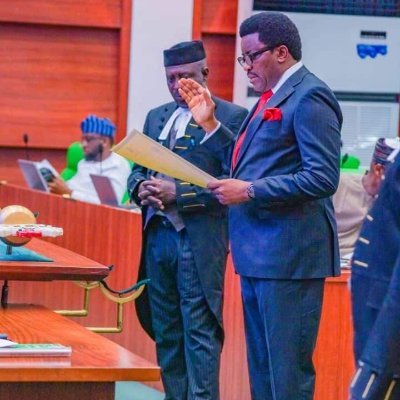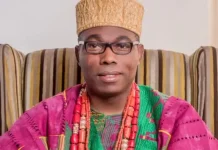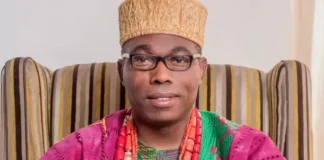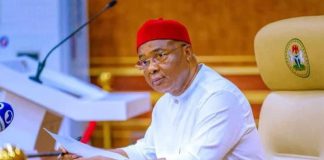🌿 Ruzu Non-Alcoholic Herbal Bitters
Ruzu Non-Alcoholic Herbal Bitters is a natural health supplement specially formulated to:
- ✅ Promote general wellness
- ✅ Detoxify the body
- ✅ Support the treatment of various ailments
Made from a powerful blend of 100% organic and medicinal herbs, Ruzu is completely alcohol-free, making it ideal for:
- 👪 All age groups
- 🌱 Health-conscious individuals
- 🌿 Anyone seeking non-alcoholic herbal remedies
Whether you're looking to boost your vitality, cleanse your system, or support healing the natural way, Ruzu Bitters offers a trusted herbal solution.
At a high-level legislative gathering on nutrition on Tuesday in Abuja, stakeholders stated that food insecurity and malnutrition in Nigeria had reached critical levels and that immediate changes in policy execution, accountability, and finance are required to buck the trend.
The House Committee on Nutrition and Food Security’s chairman, Hon. Chike Okafor, has called Nigeria’s present nutrition problem “a ticking time bomb.” Okafor stressed the need for a paradigm change in the nation’s approach to food and nutrition policy while giving the keynote talk at a national gathering of lawmakers and policymakers. In order to increase food and nutrition security in the four states of Bauchi, Jigawa, Kebbi, and Nasarawa, the gathering intends to promote policy initiatives, budget priority, and group pledges.
Targeting the states of Bauchi, Jigawa, Kebbi, and Nasarawa, the meeting is a component of the CASCADE Project, which is being carried out in collaboration with Care International and the Global Alliance for Improved Nutrition (GAIN).
“Our efforts, including donor support,” Okafor stated, “have not produced the expected outcomes. Social unrest and widespread poverty are both facilitated by hunger and food insecurity. We have to approach things differently.
He cited concerning data from the 2023–2024 National Demographic Health Survey (NDHS) and pointed out that, in spite of years of initiatives, there was a growing trend in maternal anemia, stunting, wasting, and child malnutrition. In addition, Okafor blasted the National Multi-sectoral Plan of Action for Food and Nutrition (NMPFAN 2021–2025) for its poor execution, claiming that it has probably fallen short of half of its goals.
“Especially at subnational levels, there is a clear disconnect between accountability, resource allocation, and successful policy implementation,” he bemoaned.
Stronger monitoring and evaluation systems with public dashboards and simplified KPIs; community involvement via media and civil society; performance-based incentives for local governments that meet nutrition targets; allocated funds specifically for nutrition; and increased legislative monitoring of government and donor-funded initiatives.
He issued the following warning regarding the opaqueness of donor and NGO funding operations in the field of nutrition: “We see little accountability from development partners in Nigeria, unlike in other developing countries.” We implore them to open their books willingly before we are forced to employ our constitutional authority.
Promoting
Under Speaker Tajudeen Abbas, Okafor reiterated the 10th National Assembly’s resolve to strengthen oversight, saying: “We are committed to not just increasing budgetary allocations but ensuring value for every naira spent.” We will accomplish this by implementing multi-level oversight in each of the 774 local governments.
“Weak implementation threatens the health and livelihoods of women and children despite numerous policies,” said Michael Ojo, Country Director of GAIN, underscoring the need for greater legislative support. This initiative ensures that nutrition programs have a real impact.
According to Ojo, the goal of the meeting was to increase capacity and create practical nutrition strategies for the states that took part.
With a customized action plan, each state will depart. He stated that GAIN and CARE would follow up to guarantee implementation on a national and subnational level.
“Nutrition is a development issue,” he added, emphasizing the necessity for Nigeria to assume responsibility for financing nutrition. It’s not only about donor support; it’s also about how we use our money, particularly now that states have more federal funding.
Read Also: Kwankwaso Not Active in Kano Anymore, Wants to Join APC – Presidency Official
Despite spending billions, the Jigawa State House of Assembly’s Appropriations Committee Chairman, Hon. Hamza Ibrahim, voiced dissatisfaction with the lack of progress.
“It appears that the billions invested in nutrition and agriculture are not having the desired effect,” he stated.
Inconsistencies in financial reporting were also brought to his attention: “This year, we have allotted N4.1 billion for nutrition, N3.7 billion plus N300 million from communities and N1.3 million from LGAs, but the data doesn’t match our records.” These numbers will be reviewed and reconciled.
Participants were greeted by Jenifer Orgle, Acting Country Director, CARE Nigeria, who emphasized the critical need to combat malnutrition:
“1.1 million women and children under five are the target audience for the CASCADE project. Funding for nutrition must be prioritized, and this requires legislative support. We encourage Jigawa and Kebbi to put their plans into action and commend Nasarawa and Bauchi on their success.
At the end of the two-day national dialogue, there should be unambiguous legislative promises to promote healthy diets, expedite nutrition results, and bring about quantifiable change in the four priority states.
















